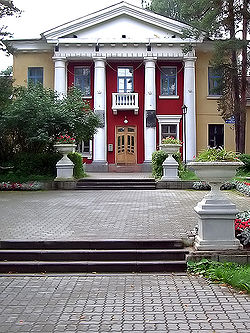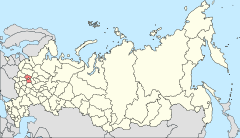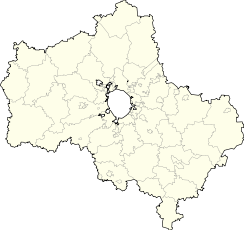- Dubna
-
For other uses of "Dubna", see Dubna (disambiguation).
Dubna (English)
Дубна (Russian)- Town[citation needed] - 
Headquarters of JINR in Dubna
Location of Moscow Oblast in RussiaCoordinates: 56°44′N 37°10′E / 56.733°N 37.167°ECoordinates: 56°44′N 37°10′E / 56.733°N 37.167°E Coat of arms Flag Administrative status Country Russia Federal subject Moscow Oblast Municipal status Urban okrug Dubna Urban Okrug[citation needed] Mayor[citation needed] Valery Prokh[citation needed] Statistics Area 7.1 km2 (2.7 sq mi)[citation needed] Population (2010 Census,
preliminary)70,569 inhabitants[1] - Rank in 2010 223rd Population (2002 Census) 60,951 inhabitants[2] - Rank in 2002 274th Density 9,939 /km2 (25,740 /sq mi)[3] Time zone MSD (UTC+04:00)[4] Founded 1956[citation needed] Postal code(s) 141980[citation needed] Dialing code(s) +7 49621[citation needed] Official website Dubna (Russian: Дубна́) is a town in Moscow Oblast, Russia. It has a status of naukograd (i.e. town of science), being home to the Joint Institute for Nuclear Research, an international nuclear physics research centre and one of the largest scientific foundations in the country. It is also home to MKB Raduga, a defence aerospace company specializing in design and production of missile systems. The modern town was developed in the middle of the 20th century (and town status was granted in 1956). Population: 70,569 (2010 Census preliminary results);[1] 60,951 (2002 Census);[2] 65,805 (1989 Census).[5]
Contents
Geography
The town is 120 m above sea level, situated approximately 125 km north of Moscow, on the Volga River, just downstream the Ivankovo Reservoir. The reservoir is formed by a hydroelectric dam across the Volga situated within the town borders. The town lies on both banks of the Volga, and the dam serves as the only bridge. The western boundary of the town is defined by the Moscow Canal joining the Volga, while the eastern boundary is defined by Dubna River joining the Volga.
Dubna is the northernmost town of Moscow Oblast.
The public transport connections to Moscow include express trains, suburban trains and bus shuttles which depart from the Savyolovsky Rail Terminal.
History
Pre-World War II
Fortress Dubna (Russian: Дубнъ) belonging to Rostov-Suzdal Principality was built in the area in 1132 by the order of Yuri Dolgoruki and existed until 1216. Fortress was destroyed during the feudal war between the sons of Vsevolod the Big Nest. Village Gorodische (Russian: Городище) was located on the right bank of Volga river and belonged to Kashin Principality. Dubna customs post (Russian: Дубненское мыто) was located in the area and was a part of Principality of Tver.
Before the Great October Socialist Revolution few villages were in the area: Podberezie (Russian: Подберезье) was on the left bank of Volga, and Gorodische (Russian: Городище), Alexandrovka (Russian: Александровка), Ivankovo (Russian: Иваньково), Yurkino (Russian: Юркино), Kozlaki (Russian: Козлаки) on the right bank.
Right after revolution one of the first collective farms was organized in Dubna area.
In 1931 Orgburo of the Communist Party decided to build Volga-Moscow canal. Genrikh Yagoda, then the leader of State Political Directorate, was put in charge of construction. The Canal was completed in 1937. Ivankovo Reservoir and Ivankovo hydroelectrical plant were also created as a part of the project. Many villages and the town Korcheva were submerged under water.
Science
See also: Joint Institute for Nuclear ResearchThe decision to build a proton accelerator for nuclear research was taken by the Soviet government in 1946. An impracticable place where the current town is situated was chosen due to remoteness from Moscow and the presence of the Ivankovo power plant nearby. The scientific leader was Igor Kurchatov. The general supervisor of the project including construction of a settlement, a road and a railway connecting it to Moscow (largely involving penal labour of Gulag inmates) was the NKVD chief Lavrentiy Beria. After three years of intensive work, the accelerator was commissioned on December 13, 1949.
The town of Dubna was officially inaugurated in 1956, together with the Joint Institute for Nuclear Research (JINR), which has developed into a large international research laboratory involved mainly in particle physics, heavy ion physics, synthesis of transuranium elements, and radiobiology. In 1960 a town of Ivankovo situated on the opposite (left) bank of the Volga was merged into Dubna.
Outstanding physicists of the 20th century including Nikolay Bogolyubov, Georgy Flyorov, Vladimir Veksler, Bruno Pontecorvo used to work at the institute. A number of elementary particles and heavy nuclei (including the 118th element) were discovered and investigated there. In recognition of that, in 1997 the chemical element 105 Dubnium (Db) was named after the town. In 1964 Dubna hosted the prestigious International Conference on High Energy Physics.
Economy
Before the dissolution of the Soviet Union, JINR and MKB Raduga were the main employers in the town. Since then their role has decreased significantly. Several small industrial enterprises have emerged, however the town still experiences some employment difficulties. Proximity to Moscow allows many to commute and work there. Plans by AFK Sistema and other investors including government structures have been announced to build a Russian analogue of silicon valley in Dubna. As of beginning of 2007, nothing has commenced.
Culture
Since 2007 Dubna is a headquarter and primary location of international jazz festival MuzEnergo[6] with free for public one-day open air festival in summer and one-week events in local venues in spring and autumn.
There are several museums in Dubna, among which are[7]:
- Museum of Archeology and Local History of Dubna
- The JINR Museum of the History of Science and Technology
- Museum of Natural History at Dubna International University
- Museum of Locks
Sport
Among sport facilities in Dubna, there are 2 stadiums, a waterski stadium on the Volga river, 3 swimming pools, tennis courts, and 5 sport complexes.
Popular water sports in Dubna include windsurfing, kitesurfing, and water-skiing.
Since 2004, Dubna has been a venue for Waterski World Cup stops. Dubna is a venue for the 2011 World Waterski Championships (July, 17-24 2011).[8]
Notable personalities
In addition to a number of world-known scientists, the following people can be noted:
- Natalia Rumyantseva, 3 times figure water skiing world champion and overall water skiing world champion of 1993, was born in Dubna and is an honorary citizen of the town. She was overall water skiing champion of Europe in 1982, 1984, 1987, 1989, 1992. Nataliya Rumyantseva cup is held annually since 1997 in Dubna.[9]
- A notable Russian Avant-garde painter Vyatcheslav Shmagin resides in the town.[10]
Trivia
- One of the world's tallest statue of Vladimir Lenin, 25 m high, built in 1937, is located in Dubna at the confluence of the Volga and the Moscow Canal. The accompanying statue of Joseph Stalin of similar size was demolished in 1963 during the period of de-stalinization.
International relations
Main article: List of twin towns and sister cities in RussiaTwin towns/sister cities
Dubna is twinned with the following sister cities:[11]
 Alushta, Ukraine
Alushta, Ukraine Givat Shmuel, Israel
Givat Shmuel, Israel La Crosse, Wisconsin, United States
La Crosse, Wisconsin, United States
References
- ^ a b Федеральная служба государственной статистики (Federal State Statistics Service) (2011). "Предварительные итоги Всероссийской переписи населения 2010 года (Preliminary results of the 2010 All-Russian Population Census)" (in Russian). Всероссийская перепись населения 2010 года (All-Russia Population Census of 2010). Federal State Statistics Service. http://www.perepis-2010.ru/results_of_the_census/results-inform.php. Retrieved 2011-04-25.
- ^ a b Федеральная служба государственной статистики (Federal State Statistics Service) (2004-05-21). "Численность населения России, субъектов Российской Федерации в составе федеральных округов, районов, городских поселений, сельских населённых пунктов – районных центров и сельских населённых пунктов с населением 3 тысячи и более человек (Population of Russia, its federal districts, federal subjects, districts, urban localities, rural localities—administrative centers, and rural localities with population of over 3,000)" (in Russian). Всероссийская перепись населения 2002 года (All-Russia Population Census of 2002). Federal State Statistics Service. http://www.perepis2002.ru/ct/doc/1_TOM_01_04.xls. Retrieved 2010-03-23.
- ^ The value of density was calculated automatically by dividing the 2010 Census population by the area specified in the infobox. Please note that this value may not be accurate as the area specified in the infobox does not necessarily correspond to the area of the entity proper or is reported for the same year as the population.
- ^ Правительство Российской Федерации. Постановление №725 от 31 августа 2011 г. «О составе территорий, образующих каждую часовую зону, и порядке исчисления времени в часовых зонах, а также о признании утратившими силу отдельных Постановлений Правительства Российской Федерации». Вступил в силу по истечении 7 дней после дня официального опубликования. Опубликован: "Российская Газета", №197, 6 сентября 2011 г. (Government of the Russian Federation. Resolution #725 of August 31, 2011 On the Composition of the Territories Included into Each Time Zone and on the Procedures of Timekeeping in the Time Zones, as Well as on Abrogation of Several Resolutions of the Government of the Russian Federation. Effective as of after 7 days following the day of the official publication).
- ^ "Всесоюзная перепись населения 1989 г. Численность наличного населения союзных и автономных республик, автономных областей и округов, краёв, областей, районов, городских поселений и сёл-райцентров. (All Union Population Census of 1989. Present population of union and autonomous republics, autonomous oblasts and okrugs, krais, oblasts, districts, urban settlements, and villages serving as district administrative centers.)" (in Russian). Всесоюзная перепись населения 1989 года (All-Union Population Census of 1989). Demoscope Weekly (website of the Institute of Demographics of the State University—Higher School of Economics. 1989. http://demoscope.ru/weekly/ssp/rus89_reg.php. Retrieved 2010-03-23.
- ^ Jazz festival "MuzEnergo" official web site
- ^ Official list of Dubna museums
- ^ The Organizing Committee of the 2011 World Waterski Championships official web site
- ^ Many-time Russian, world and European champion Natalia Rumyantseva
- ^ About Vyatcheslav Shmagin (in Russian)
- ^ Dubna partnership
External links
- (Russian) Dubna.ru - popular information portal and discussion forum, owned by local ISP "Kontakt"
- (Russian) local news and ads
- (Russian) History of Dubna
Categories:- Cities and towns in Moscow Oblast
- Populated places established in 1956
- Populated places on the Volga
- Nuclear research centers
- Cities and towns built in the Soviet Union
- Naukograds
Wikimedia Foundation. 2010.


